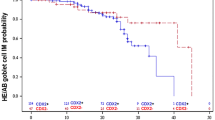Abstract
Regular endoscopic surveillance is recommended for patients with Barrett's esophagus to detect dysplasia and to diagnose carcinoma while it is in an early and possibly treatable stage. However, there are numerous unknown aspects regarding the natural history of dysplasia in this disease, and there is still a need for more accurate markers of risk of a malignant change. The aim of this study was to investigate the usefulness of DNA flow cytometry in Barrett's esophagus to define subgroups of patients showing similar histologic findings but with a different malignancy potential. Routinely formalin-fixed and paraffin-embedded tissues of 43 patients with Barrett's esophagus were processed for flow cytometric measurements (ploidy, proliferative index) and the results were compared with the histologic evolution observed in these patients. Only in the group of patients with “indefinite” dysplasia did we find statistically significant differences between the samples from patients with and without progression to more severe lesions (mean proliferative index of stable patients: 5.2% versus 8.3% in patients with progression, p= 0.001, Student's t-test). The presence in the flow cytometric analysis of a DNA aneuploid cell line is closely related to the presence of severe histologic alterations (i.e., high-grade dysplasia: p < 0.001, Fisher's exact test). Our results suggest that this procedure is at least capable of distinguishing between a real, although incipient, neoplastic process and morphologic changes of a reactive or reparative type. The increment in the tissue proliferative index could be an indicator of an early genomic instability which, with time, will develop into lesions with a more altered DNA content: aneuploidy.
Similar content being viewed by others
Author information
Authors and Affiliations
Rights and permissions
About this article
Cite this article
Giménez, A., Minguela, A., de Haro, L. et al. DNA Ploidy Status and Proliferative Activity as Markers of Malignant Potential in Barrett's Esophagus: Flow Cytometric Study Using Routinely Paraffin-embedded Tissue. World J. Surg. 24, 72–77 (2000). https://doi.org/10.1007/s002689910014
Published:
Issue Date:
DOI: https://doi.org/10.1007/s002689910014




